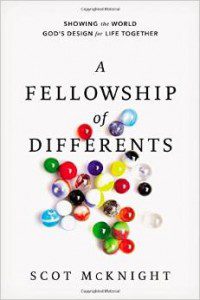Here is a simple claim I make: everything we learn about the Christian life we learn in our church. That may turn some off, but hear me out: we are not alone in anything we do; we are in a context of others in what we learn; the “context” for Christian living is a church; therefore, we learn the Christian life in the church. Some, in fact, learn the Christian life in an anti-church mode, but it is still in the context of church.
Which leads to this: What is the church actually like?
And to this: What kind of Christian life would you learn from your church?
Now I want to contend…. that the shape of your church shapes your Christian life. This is why some have jumped ship on their local church, or local church completely, and are seeking for a better way.
That is, they have left the church not simply because it didn’t meet their needs or live up to their expectation or that it fell short of their theology or preaching standards. No, I’m contending that some leave their local church because of the person that church is making them or could make them!
What is a church designed by God to be like? Two Bible verses from Paul create a kind of church that many of us don’t know, that many of us want, and that many of us know will re-shape what church is like but also what the Christian life will look like. (This is not idealism; this is reality.)
From the NRSV:
Gal. 3:28 There is no longer Jew or Greek, there is no longer slave or free, there is no longer male and female; for all of you are one in Christ Jesus.
Col. 3:11 In that renewal there is no longer Greek and Jew, circumcised and uncircumcised, barbarian, Scythian, slave and free; but Christ is all and in all!
 My contention now is clear: if this is what a church is supposed to be like, what I call “a fellowship of differents” and not a fellowship “of the sames,” then the Christian life will be about learning to dwell with those who are both like us and not like us. Just a few lines after Paul said what is found above in Colossians 3:11, he said this:
My contention now is clear: if this is what a church is supposed to be like, what I call “a fellowship of differents” and not a fellowship “of the sames,” then the Christian life will be about learning to dwell with those who are both like us and not like us. Just a few lines after Paul said what is found above in Colossians 3:11, he said this:
Col. 3:12 As God’s chosen ones, holy and beloved, clothe yourselves with compassion, kindness, humility, meekness, and patience. 13 Bear with one another and, if anyone has a complaint against another, forgive each other; just as the Lord has forgiven you, so you also must forgive. 14 Above all, clothe yourselves with love, which binds everything together in perfect harmony. 15 And let the peace of Christ rule in your hearts, to which indeed you were called in the one body. And be thankful. 16 Let the word of Christ dwell in you richly; teach and admonish one another in all wisdom; and with gratitude in your hearts sing psalms, hymns, and spiritual songs to God. 17 And whatever you do, in word or deed, do everything in the name of the Lord Jesus, giving thanks to God the Father through him.
Hardly a trace of individual growth but instead a focus on what a fellowship of differents, a church, needs in order to dwell in peace, love, and justice with one another.
First, what the church is; second, what the Christian life looks like.
So some questions from you from my book A Fellowship of Differents:
We should see different genders at church. Do we?
We should see different socioeconomic groups at church. Do we?
We should see different races at church. Do we?
We should see different cultures at church. Do we?
We should see different music styles at church. Do we?
We should see different artistic styles at church. Do we?
We should see different moral histories at church. Do we?
We should see different forms of communication at church. Do we?
We should see different ages involved at church. Do we?
We should see different marital statuses at church. Do we?Even more, if the church is a mixed salad in a bowl..
We should understand the Christian life as a fellowship. Do we?
We should understand it as a social revolution. Do we?
We should understand it as life together. Do we?
We should understand it as transcending difference. Do we?
We should understand it as honoring difference. Do we?
We should understand it as enjoying difference. Do we?
We should understand it as love, justice, and reconciliation. Do we?
I propose to you today then that the verses in Colossians 3:12-17 above are the kind of Christian life one lived in fellowship with others (alike and different) rather than one simply concerned with how “I” am growing in “my” relation with God.















